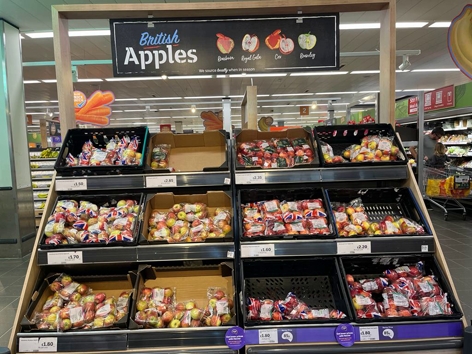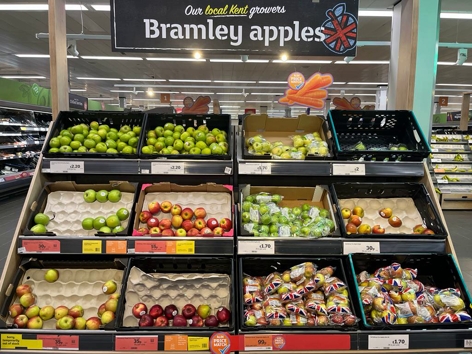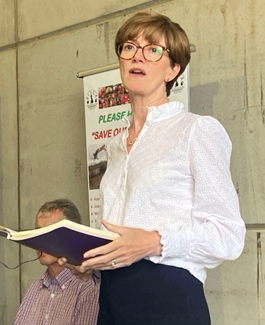

British Apples & Pears Limited (BAPL) has published sales figures for October 2023, which was British Apple Month and the first month proper of the British apple season.
This week The English Apple Man takes a closer look at the reasons behind the 'status quo'
Below: Sainsburys supported the new season with eye catching 'British Apple & Pear Displays in October


VIEW LATEST DATA
In October 2023, Lidl significantly outperformed its market share, buying 3,030 tonnes of new season British apples via BAPL members. This represents 22.1% of all British apple sales in October, compared to their grocery market share of just 7.6%
Unfortunately, other retailers have been slower to get behind new season British apples. In October 2022, Tesco topped the British apple sales chart with 2,902 tonnes. However, in October 2023 the UK's biggest supermarket only bought 1,325 tonnes of British apples. That's less than half its volume of October 2022.
October 2023 apple sales data
Commenting on the start of British apple season, Ali Capper, executive chair of BAPL, said: "Lidl's performance is outstanding. They really got behind British apples in our first month of the new season. Sainsbury's and Aldi also did very well, taking 2,764 and 2,628 tonnes of British apples respectively during the month.
"For Tesco to be so far behind last year - down 54% - and to be in fourth place in our league table for the month is very disappointing. We know from consumer comments on our social channels that they get very excited about buying new season, home-grown British apples. Sadly, Tesco has let them and British top fruit growers down."
In October 2023, Tesco sold 9.8% of all British apples sales, compared to their grocery market share 27.4%.
Below: Tesco Apple and Pear Display
Full details of BAPL member monthly sales can be viewed at: https://www.britishapplesandpears.co.uk/supermarket-sales-data.
This week, The English Apple Man visited; Morrisons at Eastbourne. M&S at Ravenside Bexhill. ALDI at Hastings and TESCO at Church Wood Hastings.
An interesting mix of British and Imported apples & pears!
M&S display generally high quality British apples & pears.
MORRISONS a mix of British apples & imported. Large display of Gala from Poland. Pears predominately imported from Belgium.
ALDI in Hastings dominated by British apples.
TESCO a mix of British & Imported apples. Pears predominately imported from Belgium and the Netherlands.
Below: Morrisons Apple Display
Below: left. British Braeburn in Morrisons and right. Gala from Poland
Below: TESCO display of dessert apples with prices displayed and right. British Jazz apples in Tesco
Below: left. M&S Gala and right. M&S Egremont Russet
Double digit cost of production increases, low returns and low grower confidence
British Apples & Pears Limited (BAPL) has published a new set of data that highlights the continued struggles for beleaguered UK top fruit growers.
The full set of data is the largest ever released at one time by the industry.
 Over the two years since 2021, British apple growers faced 30% increases in costs of production and received just 8% increases in returns from supermarkets.
Over the two years since 2021, British apple growers faced 30% increases in costs of production and received just 8% increases in returns from supermarkets.
In 2022, growers faced cost of production <1> increases of 23% and practically static returns from supermarkets that year of 0.8%. In 2023, British apple growers faced 6-9% cost of production <2> increases and received an average of 7% increases in returns <3> from UK supermarkets.
"This situation is unsustainable." Said executive chair of BAPL, Ali Capper. "The industry is on a knife edge. I've never heard suc
h desperation from our members. When you think about what a good news story our industry should be, it's heart breaking. Apples are a superfood - great for our health, the environment and our rural economy.
"The volatility in costs has become the biggest challenge faced by growers, many of them out of their control from labour and energy to the ever-increasing cost of the audit burden. We should not be talking about the slow decline of British apple orchards, and generations of family farm businesses at risk of bankruptcy."
Comments from British apple growers who completed the BAPL survey reveal the stark situation many of them face:
"I'm retiring from growing apples and my son doesn't want to touch them. He's seen the returns."
"As a younger solo grower having taken on the fruit farm, I am incredibly frustrated at how little the supermarkets are willing to pay, whilst also increasing 'hoops' to jump through."
"The industry is in crisis. The price setters are killing us."
"I have been growing fruit for over 40 years and never found it so difficult."
"Prices have stagnated for the last five years."
Given this situation, confidence in British apple growing is understandably low:
70% of growers said they are less confident than they were a year ago.
Just 3% of growers said they have a 'true partnership' with supermarkets, while 45% say retailers only buy on price and that it's not a true partnership.
Almost half (45%) of respondents said they have scaled back their future investment plans.
"Ultimately, it's not just British growers that are losing out, it's UK shoppers too." Continued Ali Capper.
"According to The Grocer's analysis of Associated data, in the two years from November 2021 to November 2023, the price of apples has increased significantly with the average price in Aldi rising by 12.6%, Lidl 12.1%, Tesco by 10.9% and Sainsbury's by 9.1%. Together these four retailers sell over 70% of all British apples and pears. And the averages hide some startling extremes, Lidl's Oaklands Red Apples 2kg went up by 50%, Morrisons British Apples (six pack) went up 39% and Tesco increased the price of its Rosedene Farms Gala apples (six pack) by 36%.
"Unfortunately, those consumer price increases are not being matched by the much-needed returns to growers."
In response to the crisis in the industry, BAPL has set out three critical changes needed to save British apple orchards:
Supermarkets to increase returns to growers to reflect the true costs of production and necessary investment.
Supermarkets to enter longer-term arrangements with growers to give farmers the confidence to grow this perennial crop, invest in much-needed technology, varieties and automation.
Supermarkets to put action behind their words of support for British farming with in-store and online merchandising that celebrates our wonderful fruit.
The BAPL data is not all bad news. Several supermarkets have undertaken excellent promotional work to celebrate the start of the current British apple season. This has included TV advertising by Lidl, print ads and social media farmer profiles by Waitrose and an email campaign, point-of-sale and social media posts by Marks & Spencer.
The promotional support for British apples has resulted in excellent October British apple sales results for some supermarkets, as reported by BAPL in November. Lidl in particular significantly outperformed its market share, selling more than any other supermarket in October (3,030 tonnes). Unfortunately, a number of UK supermarkets have been slower to get behind British apples this season and have instead been importing apples from overseas at a time when UK fruit is in plentiful supply.
British Growers Insights data revealed that in the seven-week period from 2nd October 2023 to 13th November 2023, just 16.7% of the Gala apple packs (SKUs) on shelf in Tesco were British and only 20% of Asda apple packs were British. That compares to 100% in Marks & Spencer and Lidl, and 82.4% in Waitrose, 77.8% in Sainsbury's.
"It's astounding to our growers that when we have new season British apples that taste great readily available close to home, supermarkets persist in buying from overseas. UK consumers, who want to buy British whenever they can, are being disadvantaged - and so are British apple growers."
![]() The English Apple Man Comments
The English Apple Man Comments
There is no two ways about it, British Apple growers are in a desperate situation, and without a re-alignment of costs v returns, the industry will reduce dramatically in size.
The BAPL data published cannot be disputed, but it is much more complex than the headline displays.
Large retailers discuss programmes with suppliers and set in place promotions back in March, well before the Blossom appears and 2-3 months before that year's yield can be estimated. An accurate estimate for the season cannot be realistically made until June.
Come the start of the UK season (October) Supermarkets want to introduce promotions to drive consumer demand, BUT in a season like 2023 when British Gala and Braeburn (the two major varieties by volume) are harvesting only 60-70% of the 2022 crop. The consequence, of short crop and promotion results in lower price to the grower and the marketing season which would normally run until April/May or longer, ending 'prematurely' by the end of January!
When home grown supply is short Supermarkets inevitably turn to importers. This causes British suppliers a loss of shelf space presence, the consequence being the next season (2024) vying with importers for shelf space for UK apples while Supermarkets are expected to 'return favour' to importers!
So when we see piles of Polish Gala in Morrisons, it is not such a bad thing IF it enables the supply of British Gala & Braeburn to maintain shelf space until at least March!
PRICES: This season 'generally' Supermarkets have increased prices back to the grower, but not by nearly enough. One grower illustrated this clearly: " They have raised the price back to me by 8% BUT my costs have risen by 25% - that's unsustainable!!!
And another thing! Apples by nature and variety, do not all grow to the same size. In my younger days, dessert apples (Cox for example) brought the best prices in the size range 60mm - 75mm. Today Supermarkets have decided consumer demand centres on 63mm - 73mm. marketed as 6 to a bag. This is where they pay the highest price. Smaller apples (below 63mm) and larger apples (above 73mm) are designated as lower price product!
So a grower of Gala and Braeburn must strive to grow as many as possible in a Utopian' 63mm - 73mm size. Impossible!
Ironically on the Continent, consumers prefer larger apples, so any small ones are of low value, so 'Guess What' they are more than happy to OFF LOAD their small apples over here!
![]() Well, that is for this week, than to wish all my readers
Well, that is for this week, than to wish all my readers
a Very Merry Christmas 
Take care The English Apple Man